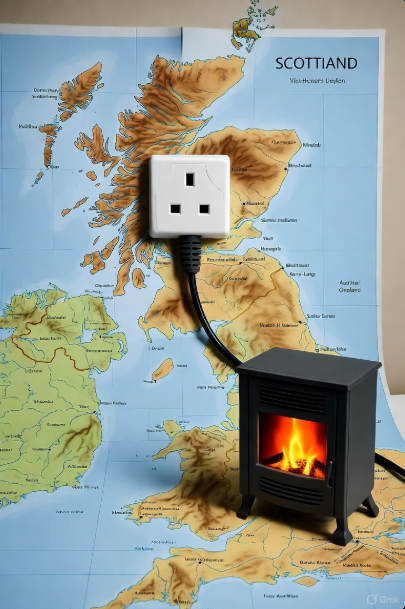Copyright talkingupscotlandtwo

Professor John Robertson OBA Carnegie UK today have reported (previous TuS post) that Scots have a ‘critically low‘ democratic well-being score of only 40%. Who is surprised? I’m surprised it’s not zero, same as mine. If you are at all aware of Scotland’s 300 year plus and current predicament in the Union, how could you get anywhere near 40%. Given their many problems with crap governance but at least their own crap government, 40% would be a fair guess for Ireland. I asked the document’s built in AI why this might be. It just listed all the wee parts leading to that summative score. Grok did the same. I had to ask a more pointed, admittedly leading question. Before you see that, can we trust Grok answers? You know, Elon Musk owns xtwitter and it. The Guardian today has In Grok we don’t trust: academics assess Elon Musk’s AI-powered encyclopedia. I agree with them, generally. A few days ago, I asked it about the environmental consequences of the land-based infrastructure development of the new Ayrshire to North Wales electricity line and it kept giving me business-friendly answers. I had to specifically ask it ‘What are the concerns expressed by those groups strongly opposed to the project?’ To be fair, it then did tell me, fully and with no attempt to undermine it. In the US, I’m sure Grok is biased against the interests of the poor, labour unions and minorities, but my experience with it so far, despite the spat with Humza Yousaf, is that it seems to have no dog in our fight for independence. His hostility to UK Labour seems far hotter. So, I asked ‘what about the theft of oil, gas and now renewable energy?’ The phrase “theft of oil, gas, and now renewable energy” is a common refrain in Scottish political discourse, particularly among pro-independence advocates, referring to the perception that revenues and benefits from Scotland’s abundant natural resources—historically North Sea oil and gas, and increasingly wind, wave, and other renewables—are disproportionately extracted and controlled by the UK Government in Westminster, with limited reinvestment or direct gains for Scottish communities. This is framed as a repeat of historical grievances, where Scotland generates vast energy wealth but faces higher energy bills, fuel poverty, and minimal local economic uplift. thenational.scot +1Historical Context: Oil and Gas “Theft” North Sea oil and gas extraction began in the 1970s, with Scotland’s waters hosting the majority of UK fields. Estimates suggest £300 billion (in today’s money) in revenues have flowed to the UK Treasury since production started, largely through taxes, licenses, and royalties managed centrally by Westminster. thenational.scot Critics, including former SNP Justice Secretary Kenny MacAskill (now with Alba Party), argue this was enabled by the 1970s McCrone Report—a suppressed UK Government document warning that independence could make Scotland one of Europe’s wealthiest nations via oil. Instead, revenues funded UK-wide spending, including Thatcher-era tax cuts and infrastructure elsewhere, while Scottish communities saw job volatility and environmental impacts without proportional benefits. thenational.scot Licensing and taxation remain reserved to Westminster, meaning Scotland has no direct control despite devolved elements like onshore planning. This has led to accusations of “plunder,” with oil/gas used to support England’s energy needs (e.g., Scottish gas powering English electricity) while Scotland imports energy at market rates. yoursforscotlandcom.wordpress.com The Shift to Renewables: A “Second Theft”? Scotland produces around 40% of the UK’s onshore wind power and is projected to supply up to 70% by 2030, alongside offshore wind dominance. Renewables generated surplus electricity equivalent to 113% of Scotland’s needs in recent years, much of it exported south via grid connections. heraldscotland.com +1 Key grievances: Grid charges and exports: Scottish generators pay the highest transmission charges in Europe (TNUoS fees) to export power to high-demand areas in England, subsidizing the UK grid by hundreds of millions annually. English/Welsh projects often receive subsidies instead. energyvoice.com Higher bills despite surplus: Scots pay more for electricity (e.g., higher standing charges, colder climate needs) than many European oil/gas-rich nations like Norway. Fuel poverty affects remote producing areas (e.g., 57% in Western Isles). believeinscotland.org Centralized control: UK bodies like the North Sea Transition Authority handle licensing; profits from Contracts for Difference (CfD) auctions go to the UK Treasury. Critics call this “England’s giant onshore wind farm,” with pylons and cables prioritizing export over local use. heraldscotland.com +1 Recent examples: GB Energy (UK Labour’s public company) is headquartered in Aberdeen but accused of partial “ownership” of Scottish projects without full revenue return. Closures like Grangemouth refinery highlight lost jobs without transition support. bbc.co.uk +1 Link to Democratic WellbeingThis perceived resource extraction directly fuels low democratic wellbeing in Scotland (40/100 in Carnegie UK’s 2025 index, the UK’s lowest nation-specific score). It breeds distrust: people feel powerless over decisions on their resources, with centralized UK control seen as ignoring local voices. Inequalities amplify exclusion—deprived or rural areas hit hardest by fuel poverty despite hosting infrastructure. Carnegie UK highlights how unmet needs and unaddressed grievances erode trust in institutions, creating a cycle of disengagement. thenational.scot +1 Pro-independence voices on X echo this as “colonial plunder,” demanding devolved energy powers or separation to retain benefits. UK Government counters that shared resources fund nationwide transitions (e.g., no new oil/gas licenses, £15.9 billion fossil subsidies redirected), ensuring energy security and jobs. Yet, for many in Scotland, it reinforces alienation—why export cheap green power while importing expensive energy? ukhealthalliance.org +1 Reforms like fairer grid pricing or community benefits could help, but without greater voice, democratic wellbeing stays critically low. https://x.com/i/grok?conversation=1985294163286340045 and ask for ‘sources’ at the bottom to get those. Critics of AI often point to its tendency to give you what you want but in the context of Scotland’s 95% pro-Union media, we need that.



